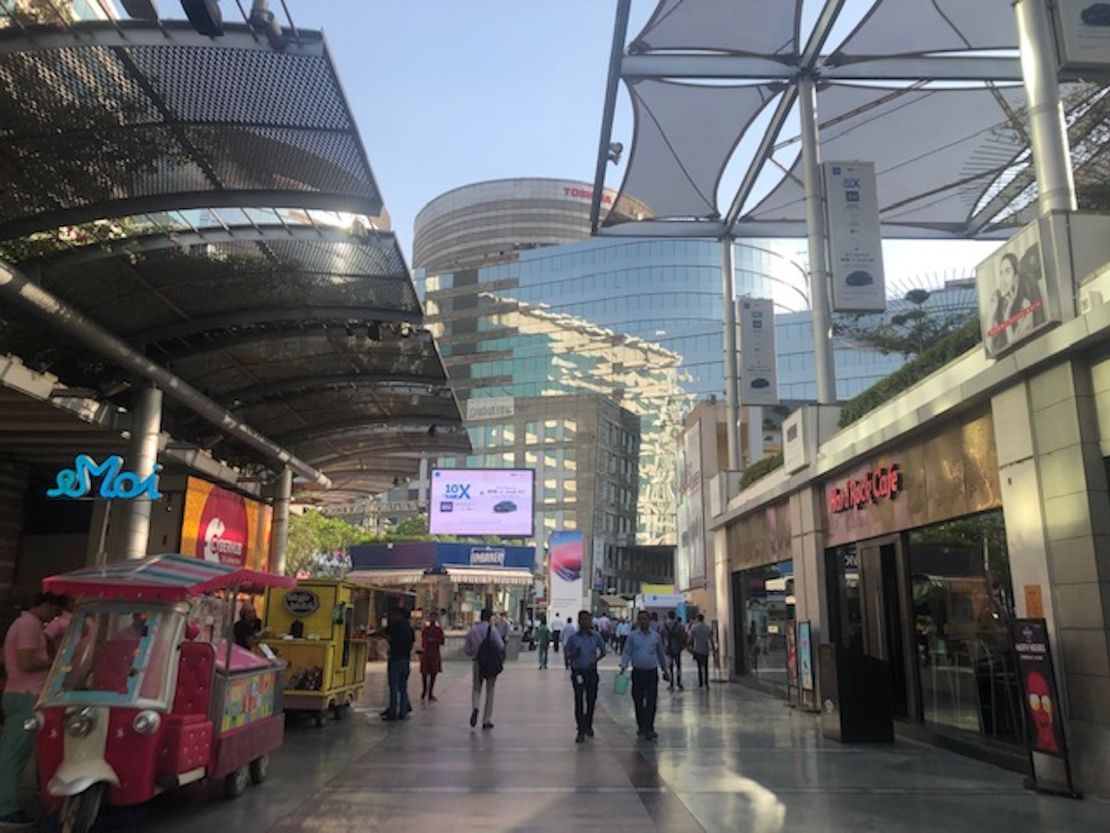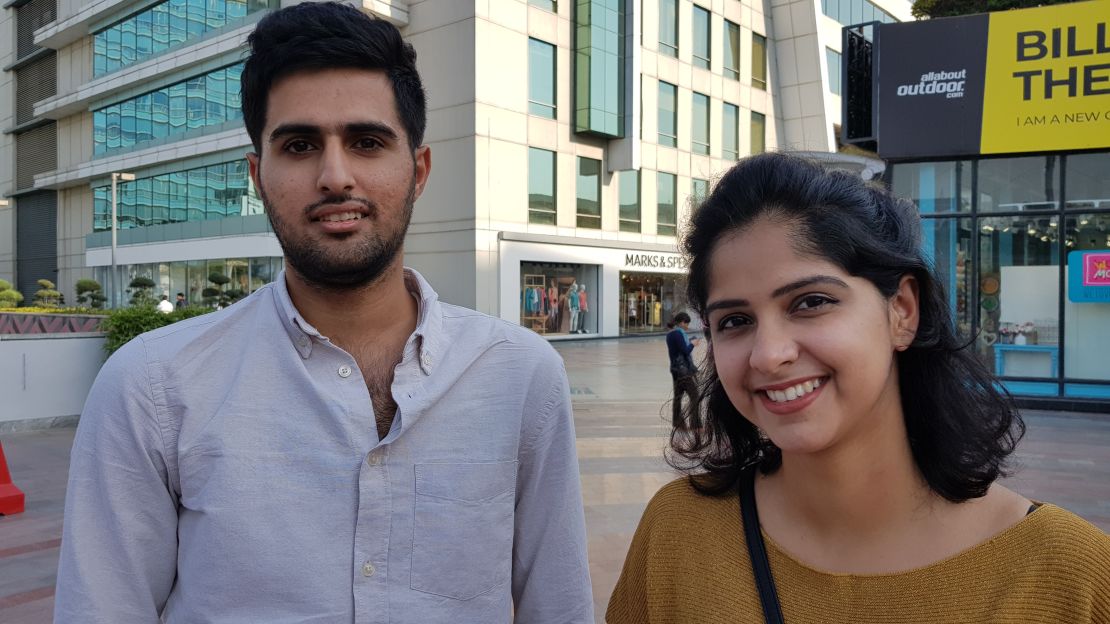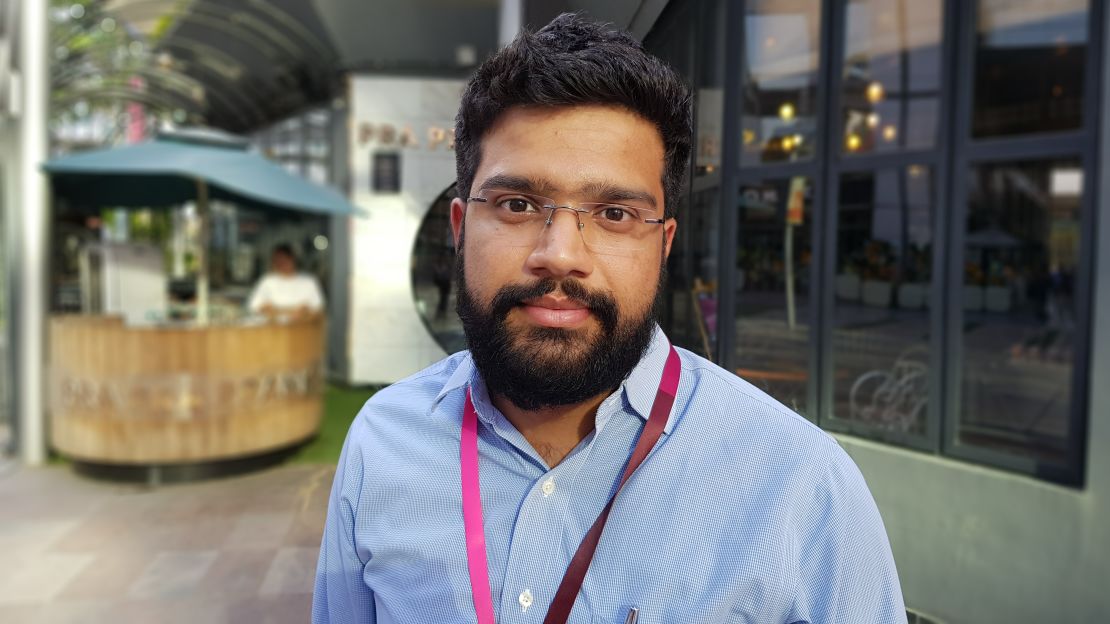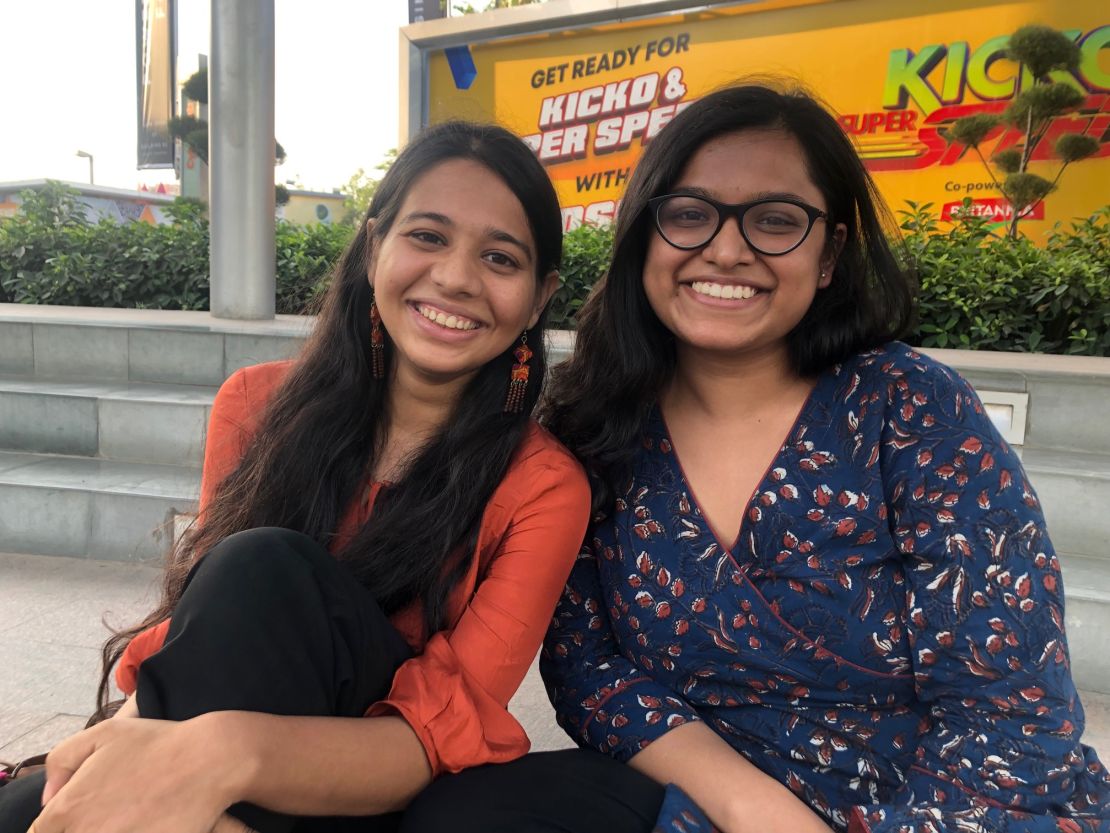For India’s aspirational millennials, Cyber City is the land of opportunity.
With its modern steel and glass aesthetic, chic restaurants and hangout spots, the tech and business hub in the satellite town of Gurugram – less than 20 miles (32 kilometers) south of the capital New Delhi – represents a confident India.
In the complex, young professionals sip Starbucks outside on rattan chairs and glass-topped tables. Facebook, Google and Samsung are among the Fortune 500 companies to have offices there, luring young Indians determined to kick-start their careers.

Ritu Kumar Maury is one such person. He’s one of six sons of a farmer in the far north of Uttar Pradesh state, near the border with Nepal.
“I think this is like a land of opportunity,” the 18-year-old said. “Back home in the villages we have small houses but here there are these huge buildings, you just look around, it’s crazy.”
Maury works in housekeeping, but wants to get into the army. “I’m still educating myself,” he said.
India has the world’s largest population of young people, with 422 million people between 15 and 34 years old, according to the most recent census data taken in 2011.
And while other Asian nations such as China deal with an aging population, India’s youth could drive the country’s economy and reshape the country.
“A country’s ability and potential for growth is determined by the size of its youth population,” said a 2017 report by India’s Central Statistics Office. “This section of the population need to be harnessed, motivated, skilled and streamlined properly to bring rapid progress for a country.”
The Indian youth vote also holds significant political clout. Out of a total of 900 million eligible voters, as many as 84 million – including 15 million aged 18 or 19 – cast ballots for the first time.
Youth will make ‘New India’ a reality
In 2014, Indian Prime Minister Narendra Modi swept to power in part on a promise of economic renewal, making a point to appeal to his young voter base.
Many young professionals in Cyber City are happy with what Modi has done the past five years. His vision of a New India – built on a strong economy, development, innovation and entrepreneurship – has kept them energized.
“I think Modi is a strong leader,” said business grad Shreya Chopra, 23. “He’s very charismatic and I think our country needs that right now.”
Chopra said Modi’s flagship development program, Swachh Bharat, or “Clean India” mission, has been doing good work for the country’s poor and that India “now needs to ride the technology wave.”
Modi’s Swachh Bharat was designed to improve sanitation, clean streets and provide electricity and infrastructure in urban and rural areas.
According to the mission’s website, more than 90 million toilets have been built in households since October 2014 and there are now 560,000 open defecation-free villages.

Subodh Singh, 36, who works in banking, says more infrastructure and new roads are being built than under the previous administration.
“Basic day to day – using metro, train, bus – it’s better now,” he said. “Nobody can achieve 100% of their promises, but as far as I’m concerned, I think 40-50% (Modi) is achieving.”
If Modi wins another term, he will need to continue to impress a young, professional generation who are increasingly independent and well-traveled, with many going abroad to study or work.
Jasdeep Singh, 23, who just completed his MBA and is about to start working for beer giant Budweiser, said Modi’s vision of modern India was aspirational to him and his peers.
“A lot of my friends when they travel to other countries they are seeing the standard of living and they want that back in our country as well,” he said. “Modi stands for image of India that India is no longer a country that cannot stand on its own.”
“If you see India before four to five years ago, no one wanted to talk about politics. Young people used to hate politics. After Modi has come, young people are loving it,” said Ashu Bahdwaj, a 24-year-old chartered accountant.
But they are realistic about what can be achieved in one term.
“You cannot change India in five years,” said Tajeet Singh, 34, who works in banking operations. “It will take time.”
And many in Cyber City have their own issues with Modi.
“There is this tendency that he’s more conservative than a young, modern, city-living, average young guy would like him to be. But then I think that has more to do with his party,” Jasdeep Singh said.
“How do we call ourselves a superpower when there is open defecation? That’s a real problem in our country,” said Adhyasha Kar, a 22-year-old specialist in HR.
While Modi enjoys a big support base among the country’s youth, many young people, like Kar, are angry over a lack of jobs – a key BJP campaign pledge. They say Modi has broken his promise to generate jobs for India’s young people, around 12 million of whom enter the workforce every year.

A leaked five-yearly survey, published in the Business Standard, reported that India’s unemployment rate had risen to its highest in 45 years. The government has not released the figures.
“He’s not really creating jobs,” Kar said.
China ‘important’ for India’s economy
Another important issue for young voters in Cyber City was competition with China. Modi has made it clear that he wants to turn India into an economic superpower to rival its northern neighbor. India’s economy already surpassed China’s as the world’s fastest-growing major economy in 2015, but there has been a deceleration in recent years.
While India is a smaller nation that China, it has more young people who will be the generation to propel India forward.
While some said this dream is a long way off yet, others are optimistic.
“It’s doable,” Bahdwaj said. “You see on the news that all the big business are coming to India. And changing from China to India. Even Apple is shifting their base from China to India. So I think on this front they are doing exceptionally well.”
To those ends, Modi has made a point over the past five years to bolster India’s relations with foreign nations, reportedly making 41 international trips, including France, Pakistan, China and several to the US. Though there is debate about what concrete results those trips have garnered.
Relations between India and China, however, are tenuous. Modi met Chinese President Xi Jinping in April 2018 in an attempt to mend ties following a turbulent period in cross-border relations.
China and India engaged in a bloody border war in 1962, and skirmishes have continued to break out sporadically in the decades since.
Young professionals in Gurugram said good relations with China are important, especially if India wanted to rise economically.
“It’s all about economy,” Jasdeep Singh said.
“All over the world, governments are made or fall on the basis of how economically well the country is doing. Without China, without trade with China and strong economic relations, I don’t think India can reach its potential,” he said.
Subodh Singh said while he didn’t think India could compete just yet, the nation “cannot survive without China” – adding that most of the mobile phones in India were Chinese.
“We should be closer with China,” he said. “Even the US can’t survive without China.”
Modi supporters praise actions in Pakistan
Some young professionals in Cyber City praised Modi for his strong stance on defense. Following a deadly terrorist attack on Indian paramilitary troops in the Indian-controlled Kashmir district of Pulwama in February, Modi launched airstrikes across the Line of Control, the de facto border separating India and Pakistan.
While Modi said they were targeting a terrorist training camp, Pakistan disputed that version of events and denied the existence of a militant camp there.
Nevertheless, being seen to be tough on Pakistan shored up support from his party’s nationalist domestic base at a crucial political time. India went to the polls just over two months later.
For the young Modi supporters, his actions with Pakistan were the actions of a strong leader.
“India has always been a nation that has taken a defensive stance. We don’t make the first move itself. India was right to target the terrorist camps which have been spreading terror,” Chopra said.
Bahdwaj said it was important for India’s standing on world stage. “We are very proud with what he has done on the national security front,” he added.
Not everyone agrees, however.
“I’m not sure what he’s defending us from actually. Where was the danger to begin with? We have too many issues within the country right now and whether its against Pakistan or China I think its just political,” Kar said.

Hindu nationalism is ‘media hype’
Critics say Modi’s term has been marked with a swing to the right – and minorities, especially Muslims and Dalits are bearing the brunt of nationalist rhetoric. Lynchings over cow slaughter have risen over the past five years, according to Human Rights Watch, and many Muslims are fearful of what another five years will bring.
But among those interviewed in Gurugram, Modi’s nationalism isn’t seen as such a bad thing.
“I don’t think educated people give any value to these things,” said Tajeet Singh. “Some targeted peoples are happening,” he said, adding that much of the nationalism was “media hype.”
“I think there is nothing wrong about (nationalism),” Bahdwaj said. “Being patriotic and everything its good for the nation. I don’t think there is any harm in it.”
Others disagree, saying religious divisions in communities and even in classrooms are now more pronounced.
“Religion has become a bigger and bigger issue. Until now I didn’t know half my friend’s religion until a a few years ago because we didn’t used to discuss that. No one cared about it until now,” said Bayar Jain, a 23-year-old graduate student.
If Modi wins another term, when results are announced on May 23, he will need to ensure the country stays on track to meet the aspirations of the young. They have said five years is too soon to make any real change – but will that support still be there in another five?









